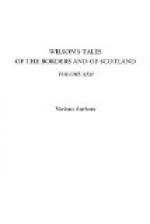UPS AND DOWNS; OR, DAVID STUART’S ACCOUNT OF HIS PILGRIMAGE.
Old David Stuart was the picture of health—a personification of contentment. When I knew him, his years must have considerably exceeded threescore; but his good-natured face was as ruddy as health could make it; his hair, though mingled with grey, was as thick and strong as if he had been but twenty; his person was still muscular and active; and, moreover, he yet retained, in all their freshness, the feelings of his youth, and no small portion of the simplicity of his childhood. I loved David, not only because he was a good man, but because there was a great deal of character or originality about him; and though his brow was cheerful, the clouds of sorrow had frequently rested upon it. More than once when seated by his parlour fire, and when he had finished his pipe, and his afternoon tumbler stood on the table beside him, I have heard him give the following account of the ups and downs—the trials, the joys, and sorrows—which he had encountered in his worldly pilgrimage; and, to preserve the interest of the history, I shall give it in David’s own idiom, and in his own words.
“I ne’er was a great traveller,” David was wont to begin: “through the length o’ Edinburgh, and as far south as Newcastle, is a’ that my legs ken about geography. But I’ve had a good deal o’ crooks and thraws, and ups and downs, in the world for a’ that. My faither was in the droving line, and lived in the parish o’ Coldstream. He did a good deal o’ business, baith about the fairs on the Borders, at Edinburgh market every week, and sometimes at Morpeth. He was a bachelor till he was five-and-forty, and he had a very decent lass keep’d his house, they ca’d Kirsty Simson. Kirsty was a remarkably weel-faur’d woman, and a number o’ the farm lads round about used to come and see her, as weel as trades’ chields frae about Coldstream and Birgham—no that she gied them ony encouragement, but that it was her misfortune to hae a gude-looking face. So, there was ae night that my faither cam’ hame frae Edinburgh, and, according to his custom, he had a drap in his e’e—yet no sae meikle but that he could see a lad or twa hingin’ about the house. He was very angry; and, ‘Kirsty,’ said he, ’I dinna like thae youngsters to come about the house.’
“‘I’m sure, sir,’ said she, ‘I dinna encourage them.’
“‘Weel, Kirsty,’ said he, ’if that’s the way, if ye hae nae objections, I’ll marry ye mysel’.’
“‘I dinna see what objections I should hae,’ said she, and, without ony mair courtship, in a week or twa they were married; and, in course o’ time, I was born. I was sent to school when I was about eight years auld, but my education ne’er got far’er than the rule o’ three. Before I was fifteen, I assisted my faither at the markets, and in a short time he could trust me to buy and sell. There was one very dark night




